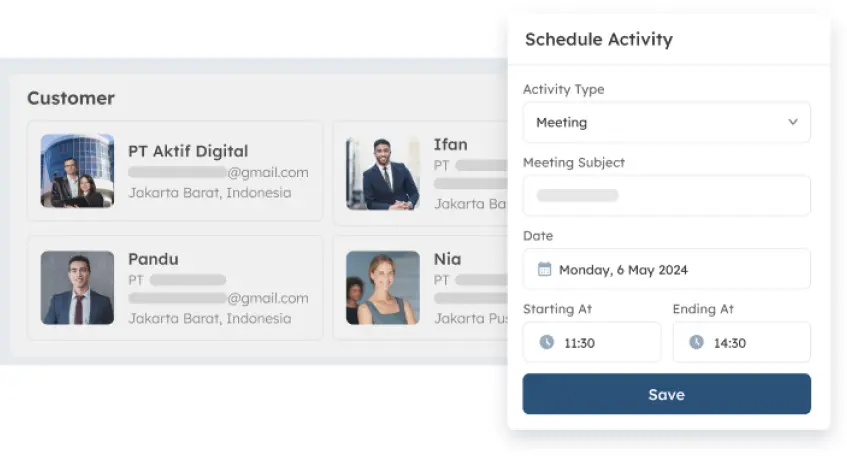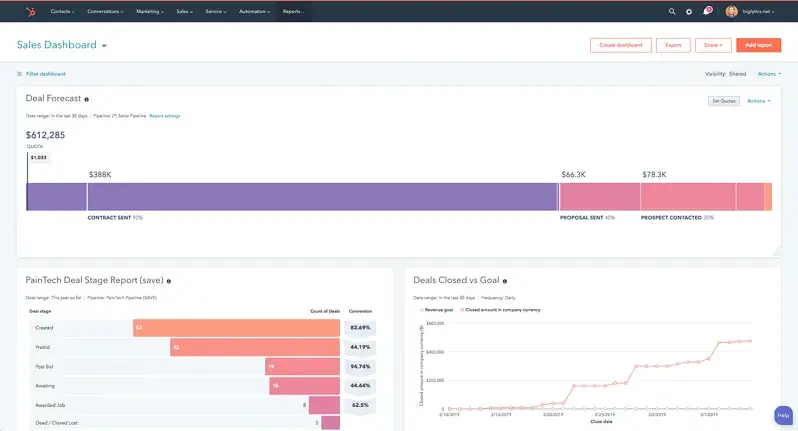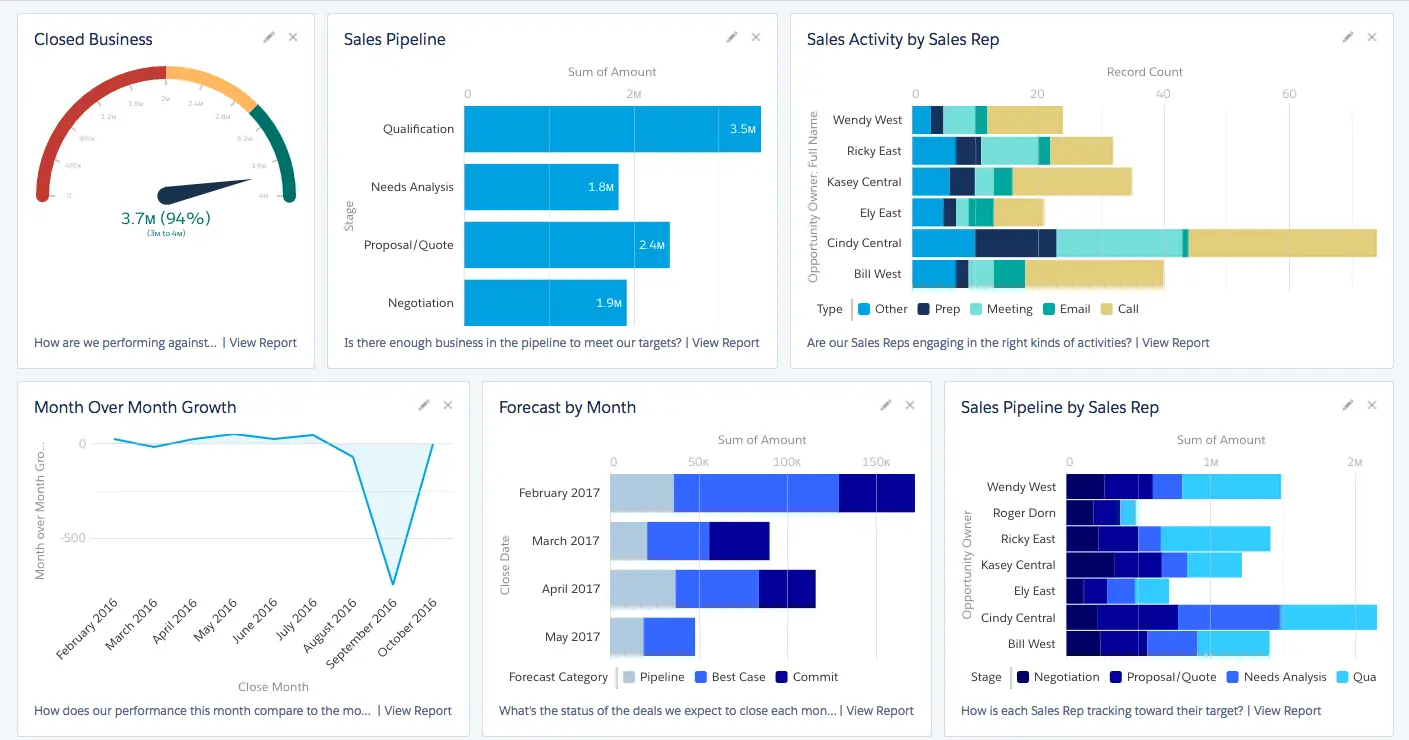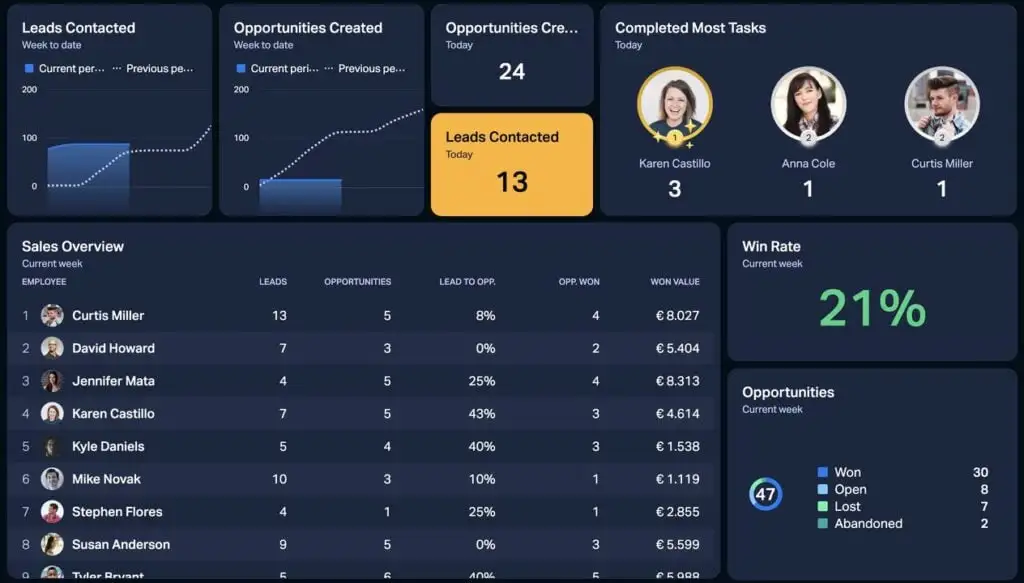In today’s fast-paced business world, managing a sales team without the right tools is almost impossible. Sales management software has become a non-negotiable asset for companies that want to scale and stay ahead of the competition.
According to IMDA, SMEs fuel Singapore’s economy, employing two-thirds of the workforce and accounting for roughly half of the GDP. In today’s fast-paced business environment, these companies require the necessary tools, such as sales management software, to scale effectively and remain competitive.
This article will explore what sales management software is, explain why it plays a critical role in driving business success, and help you identify the best solutions tailored for your Singapore-based business needs, ensuring efficiency and sustainable growth.
- Sales management software is a central hub that streamlines sales by managing leads, tracking customers, and analyzing performance.
- The top 10 sales management software in Singapore for 2025 include ScaleOcean, Salesforce, HubSpot, and Pipedrive.
- When evaluating options, it’s crucial to look for key features like lead tracking, sales automation, and detailed performance analytics.
- ScaleOcean’s sales management software provides a comprehensive solution that addresses these challenges, offering robust analytics and automation to drive significant business growth.

What is Sales Management Software?
Sales management software is a centralized platform for streamlining the sales process. It enables firms to manage leads, track customer interactions, and evaluate performance. It serves as the hub for sales activity, providing organization and clarity in everyday operations.
This program helps managers by tracking team performance, projecting sales, and identifying bottlenecks. Unlike typical CRM products, it focuses on explicitly managing sales operations, giving leaders the tools they need to align teams and efficiently drive company goals.
Why Sales Management Software is Essential for Your Business
Sales management software is more than a minor change. It transforms sales outcomes and overall business health by enabling smarter, sustainable growth. Here are the key reasons why this software is essential for your business:
1. Higher Revenue
When you streamline your sales efforts, it’s pretty natural that you’ll end up closing more deals. This sales management software really helps you pinpoint those top leads and makes sure nothing important gets missed, which is a common worry for many teams.
With improved visibility into your sales pipeline, your team can genuinely move prospects through the stages much more effectively. This often shortens the sales cycle, letting you manage more deals within the same timeframe, which is a big plus for any business.
2. Increased Team Productivity
Automation is a pretty significant component of these sales management system software platforms. They take care of all those repetitive admin tasks, things like data entry or sending out follow-up reminders, which can really eat up time. This essentially frees your sales team to focus on their core strength.
When all the information is centralized, your team isn’t wasting precious time digging around for data anymore, which is a common problem. They’ll have everything they need, like contact history and past communications, right there, accessible. This really helps make their workflow a lot smoother, contributing to a team that’s more efficient overall.
3. Improved, Data-Driven Decision-Making
Sure, gut feelings have their place, but it’s really data that underpins genuinely smart business decisions. Good sales management software offers up really detailed reports and analytics across all parts of your sales operations. This means you get a clear, unbiased picture of what’s actually working, and what might not be, which is incredibly valuable.
These insights reveal top reps, effective strategies, and areas needing improvement. They guide smarter decisions, moving beyond guesswork. This evidence-based approach is vital for creating a strong sales contract and boosting overall sales performance.
4. Better Customer Relationships
Truly understanding customers is the foundation of lasting relationships. According to GoBusiness, Enterprise Singapore supports up to 50% for SMEs, with no support for non-SMEs, for CRM solutions. This type of sales management tool stores interactions and preferences, enabling more personalized and consistent experiences.
When your team has this full 360-degree view of a customer, they can actually anticipate needs and just provide genuinely better service, which is fantastic for engagement. This approach not only helps you keep customers longer but also turns those happy customers into real brand advocates.
The Top 10 Sales Management Software for Singapore in 2025
Choosing the right sales management software in Singapore can feel overwhelming, with many platforms tailored to different business sizes and unique needs, from startups to large enterprises. So, here’s a breakdown of what looks like some of the top contenders for 2025, to help you get started.
1. ScaleOcean’s Sales Management Software
ScaleOcean’s sales management system is built with growing businesses in mind, offering a powerful yet intuitive system to use. Its standout features are definitely its excellent pipeline management and some truly robust reporting capabilities, making it easy to see your whole sales management clearly.
ScaleOcean offers a comprehensive solution to common sales management challenges. Automation and advanced analytics help teams work smarter and increase productivity. Supported by the CTC grant, ScaleOcean enables businesses to adopt these digital tools affordably and sustainably.
Key Features:
- Seamless End-to-End Pipeline Visibility: Clear pipeline view to track, manage, and accelerate sales from lead to closing.
- Smart Automation that Boosts Productivity: Automates tasks and workflows to save time and increase team sales efficiency.
- Real-Time Analytics for Smarter Decision-Making: Provides real-time insights for better decisions, sales tracking, and performance monitoring.
- Anywhere Access for Field Sales Teams: Mobile access enables field teams to update and manage sales tasks in real time.
- Integrated Contact & Lead Management System: Centralizes leads and contacts with auto-tracking, scoring, and prioritization features.
| Pros | Cons |
|---|---|
|
|
2. Salesforce Sales Cloud
There is a good reason why Salesforce is still regarded as one of the leading brands in the sector. It is a platform appropriate for large-scale enterprise operations since it provides a wide range of tools that can be tailored for different business needs.
However, its intricacy may be a disadvantage, particularly for smaller groups. The extensive feature set frequently leads to a steep learning curve. Nonetheless, it continues to be a well-known choice in the industry for those who need its wide range of features.
Key Features:
- Highly customizable CRM framework
- AI-powered sales forecasting
- Advanced workflow automation
- Wide third-party app ecosystem
| Pros | Cons |
|---|---|
|
|
3. HubSpot Sales Hub
HubSpot‘s user-friendly interface and emphasis on inbound marketing have helped it become a well-known brand. A unified platform for managing the customer journey from beginning to end is created by the Sales Hub’s seamless integration with various marketing and service technologies.
They also provide a free version, which is a good place for small businesses to start. You can choose more sophisticated features as your company expands, providing flexibility that many businesses seeking scalable solutions find appealing.
Key Features:
- Integrated with HubSpot marketing tools
- Email tracking and automation
- Deal pipeline management
- Built-in reporting dashboards
| Pros | Cons |
|---|---|
|
|
4. Pipedrive Sales System
Because Pipedrive is based on the idea of a sales pipeline, it is simple to use and intuitive. Teams are able to easily track deals through all stages because of its simple visual interface. The design prioritizes usability to meet the demands of sales teams.
It might work well for small and medium-sized companies seeking an easy-to-use, activity-based sales tool. By providing a platform that prioritizes goal achievement and outcomes, it assists teams in maintaining focus on the steps that result in closing agreements.
Key Features:
- Visual pipeline management
- Activity-based selling tools
- Sales reporting and insights
- Email and calendar sync
| Pros | Cons |
|---|---|
|
|
5. Zendesk Sell Sales Management Solution
With Zendesk Sell, Zendesk, which was first recognized for its customer support solutions, has entered the sales CRM market. It is a useful choice for sales teams who must manage activities while on the go because of its clear interface and strong mobile capabilities.
Its combination with Zendesk’s support platform, which offers a comprehensive view of every customer, is what makes it unique. By bringing the sales and support teams closer together, this integration promotes a more unified strategy that enhances the client experience as a whole.
Key Features:
- Clean, modern interface
- Strong mobile app support
- Integration with Zendesk Support
- Sales activity tracking
| Pros | Cons |
|---|---|
|
|
6. Freshsales System
The AI-powered features of Freshsales, a component of the broader Freshworks ecosystem, are well-known. It positions itself as a complete sales solution by providing features like lead scoring, analytics, and workflow automation that help sales teams operate more effectively.
Its integrated phone and email system, which combines communication, is a useful feature. With a suite of tools that offer a multitude of functions to help teams with their everyday activities, this connection streamlines the process.
Key Features:
- AI-powered lead scoring
- Built-in phone and email system
- Workflow automation
- Customizable reports and analytics
| Pros | Cons |
|---|---|
|
|
7. Copper Sales Management System Software
Copper is a CRM made especially for Google Workspace users. It offers a time-saving solution by reducing manual data entry and increasing workflow efficiency through direct integration with Gmail and other Google apps.
Copper can be a suitable choice for sales management if your team uses Google Workspace extensively. With an emphasis on simplicity and increasing productivity across sales operations, the integration makes adoption easier for the majority of users.
Key Features:
- Deep integration with Google Workspace
- Automatic data capture from Gmail
- Pipeline management tools
- Reporting and insights
| Pros | Cons |
|---|---|
|
|
8. Keap Sales Management System
Keap, previously known as Infusionsoft, provides a suite of tools for small businesses that integrate sales and marketing automation with CRM. By automating several phases of the sales process it assists companies in managing client connections and nurturing prospects.
Its automation features make it appropriate for companies that need substantial support for their sales operations, even though it might seem more complicated than some other sales management systems. For those seeking these features, it remains a good choice.
Key Features:
- CRM with marketing automation
- Lead nurturing workflows
- Task and appointment automation
- Payment and invoicing tools
| Pros | Cons |
|---|---|
|
|
9. Zoominfo Sales Management
ZoomInfo SalesOS is a complete B2B intelligence platform in addition to being a CRM. It gives teams access to a sizable database of contacts and business data, facilitating the efficient identification and communication with important decision-makers.
For focused prospecting and lead generation, this platform is helpful. For organizations concentrating on outbound sales tactics, its high-quality data makes it a viable choice, providing helpful insights and resources for identifying possible leads.
Key Features:
- Massive B2B contact database
- Advanced lead generation tools
- Real-time company insights
- Integration with major CRMs
| Pros | Cons |
|---|---|
|
|
10. Insightly Sales Software
Insightly is a flexible platform that blends project management and CRM functionalities. Businesses with intricate, multi-stage sales cycles or significant post-sale projects would particularly benefit from this integration, which keeps everything organized and on track.
One practical benefit is its capacity to immediately connect projects to agreements and relationships. This feature, which offers a single workflow for increased efficiency, is especially helpful for service-based firms or those with lengthy, intricate implementation processes.
Key Features:
- CRM with project management features
- Pipeline and opportunity tracking
- Workflow automation
- Contact and project linking
| Pros | Cons |
|---|---|
|
|
Key Functions and Features to Look For
When you’re out there looking at different sales management software options, it’s pretty common to get swamped by all the fancy features and extra bells and whistles. But really, there are just some core functions that are totally essential for any decent system to have. Here are the key functions and features to consider:
1. Manages Customer and Lead Data
Any good sales management system really needs to be that one central database for every contact you have. Think of it, storing everything from just their basic contact info all the way to really detailed interaction histories, which then sets up a single source of truth for your entire team.
This capability is just so important to make sure everyone has access to the same, current information, preventing those annoying data silos, and making customer handoffs between team members really quite seamless. It truly is the backbone of the system, or at least it should be.
2. Tracks Leads, Deals, and Pipeline
Being able to visualise your sales pipeline is genuinely one of the most critical things any sales management system software needs to offer. The software should give you a way to track every single lead and deal as they move through those various stages, and this kind of visibility is absolutely crucial for accurate sales forecasting.
What’s also really neat is how it helps managers quickly see those deals that might be stuck or even at risk of just falling through, allowing them to jump in, offer support, and get things moving once more. This sort of proactive management, you know, truly helps to maximise conversion rates across the board.
3. Automates Sales Tasks
Honestly, your sales team really shouldn’t be bogged down with administrative stuff all day long. That’s just not what they’re there for. The best sales management software automates tasks like follow-ups, scheduling, and record updates, freeing time for revenue-generating activities.
Plus, with workflow automation and an integrated sales account, you can pretty much guarantee that no important steps in the sales process ever get missed, helping keep things consistent and high-quality across the whole team. This consistency is really key when you’re looking at scaling your operations up.
4. Analyzes Performance and Sales Reporting
It’s a simple truth, you really can’t improve something if you’re not measuring it first, right? So, your sales management software absolutely has to come with strong reporting and analytics, covering everything from those individual rep performance dashboards to higher-level sales trend reports for executive review.
Having these kinds of insights just makes it so much clearer what’s actually working and what might not be, allowing you to use that data to fine-tune strategies, give really targeted coaching, and just make smarter decisions overall. Ultimately, it’s all about fostering that culture of continuous improvement.
5. Facilitates Team Collaboration
Sales, it’s often a real team sport, so having solid collaboration features is truly non-negotiable for any effective sales management system. The software needs to make it super easy for everyone to share notes, assign tasks, and just communicate effectively about specific deals, ensuring that literally everyone is on the same page.
These good collaboration tools work wonders for breaking down communication barriers and building a much more cohesive, effective sales unit, which is particularly vital for teams operating with remote or hybrid workers these days.
6. Integrates with Other Business Tools
Let’s be real, your sales software isn’t operating in its own little bubble; it absolutely needs to play nice with all the other tools you use daily, things like your email client, calendar, and your marketing platform. Strong integration capabilities, honestly, are absolutely non-negotiable, plain and simple.
When you have these seamless integrations, it just makes for a much more unified and efficient workflow, meaning you’re not constantly jumping between different applications, which saves a ton of time and seriously cuts down on the risk of those dreaded manual data entry errors.
Conclusion
The appropriate sales management software is determined by each company’s specific requirements. The goal is to find a platform that not only organizes data but also enables teams to work more efficiently, manage sales better, and generate long-term corporate success.
ScaleOcean provides solutions for lead management, task automation, and reporting, which directly address daily sales difficulties. These products provide a visible ROI for teams. Schedule a free demo today to learn more about how ScaleOcean may help your business expand.
FAQ:
1. What is the best sales management software?
Choosing the best sales management software depends on business needs and budget. Salesforce fits large enterprises, HubSpot works well with marketing, and Pipedrive focuses on pipelines. ScaleOcean is another excellent option, offering smart, user-friendly solutions for growing teams.
2. Which CRM software is best?
The ideal CRM software should be flexible, scalable, and easy to use. Salesforce is highly customizable, HubSpot links sales with marketing, while Zoho CRM is cost-effective. ScaleOcean provides a balance of simplicity and analytics, making it a great fit for expanding businesses.
3. Which CRM is best for beginners?
Beginners often prefer CRMs that are easy to set up and navigate. HubSpot’s free plan is accessible, Zoho CRM delivers affordable entry options, and Copper integrates directly with Google Workspace. ScaleOcean also offers a straightforward platform, perfect for new teams.
4. What is sales management software?
Sales management software is designed to organize sales tasks, track leads, and analyze team performance. It consolidates activities in one platform, automates routine processes, and offers insights that improve efficiency, helping businesses achieve stronger sales results.














 PTE LTD..png)
.png)

.png)








.png)
.png)
















